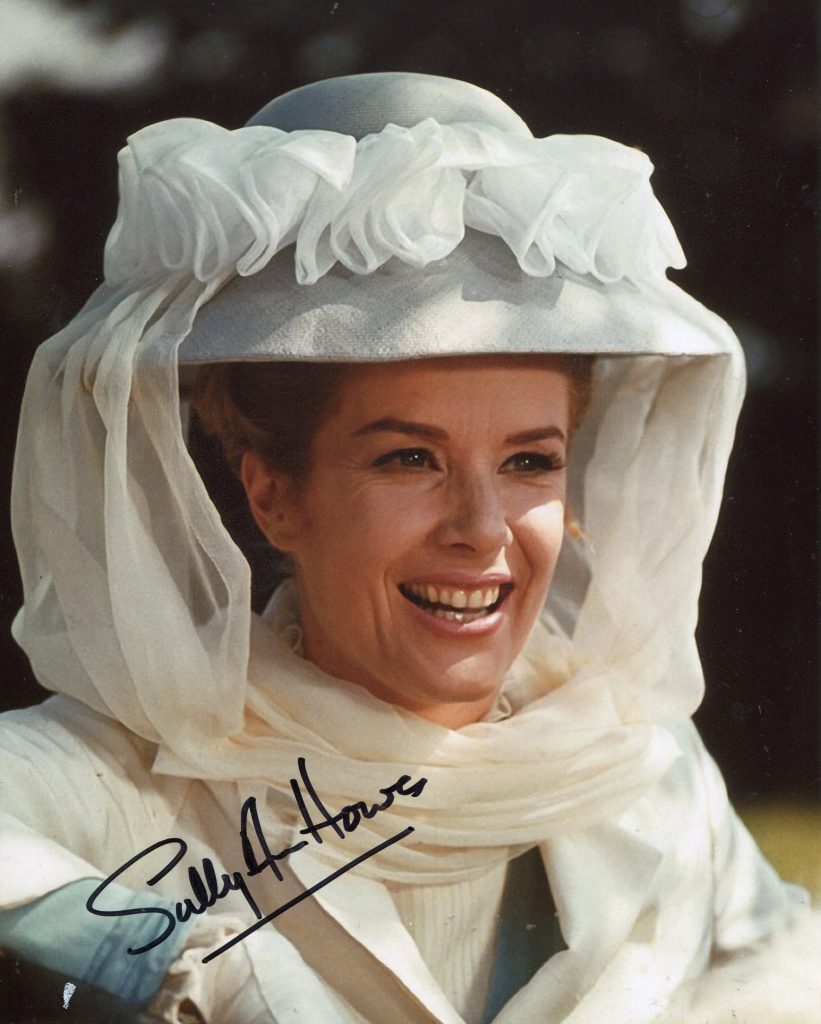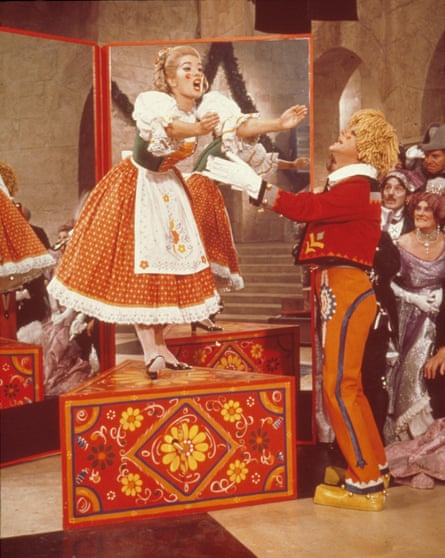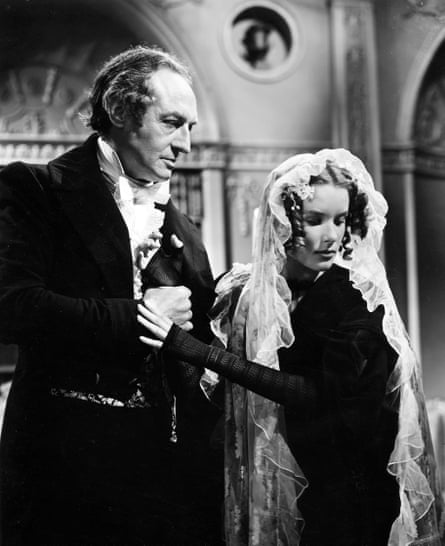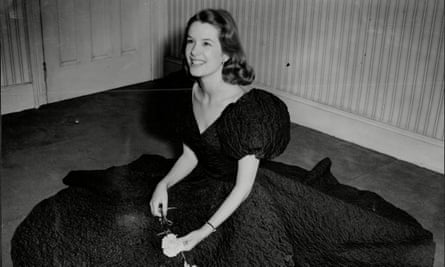
Although she never starred in any original productions of his shows on Broadway, Richard Rodgers described Sally Ann Howes, who has died aged 91, as “the greatest singer who ever sang on the American musical stage”. Best known for playing Truly Scrumptious opposite Dick Van Dyke as Caractacus Potts in the film Chitty Chitty Bang Bang (1968), Howes was a classic instance of the star who never really was, despite her talent and impeccable pedigree.
She had dual nationality in Britain and the US, like Julie Andrews, in whose track she followed, first as a child star in British films before and after the second world war, then as Eliza Doolittle in My Fair Lady in 1958. The show marked her Broadway debut, and she played in it for a year, and for a higher salary than her predecessor. When Andrews declined the role of Truly Scrumptious, in she stepped.
In 1973 the hills were alive again, not with the sound of Julie, but of Sally, as she led a US tour of The Sound of Music. The upside of this nearly star status was that Howes could make surprising and adventurous choices in her work, such as appearing in a West End thriller, Lover (also 1973) by Brian Clemens, with Max Wall, or a musical version of James Joyce’s The Dead (2000), with Blair Brown and Christopher Walken, off-Broadway and, briefly, on.
Although she was six years older than Andrews, the parallel career landmarks of both were uncanny. Three years before Andrews made her name in New York in Sandy Wilson’s The Boy Friend (1954), Howes made her stage debut in a show for which Wilson had written the lyrics, Caprice (1951), a musical comedy of domestic confusion in the south of France, at the Alhambra theatre in Glasgow.
Unfortunately, on her very first number on any stage, the conductor fumbled the score to the floor and Howes had to sing unaccompanied while the music sheets were noisily gathered, the instruments picked up their places one by one and, following them tentatively, she modulated gradually back into the correct key. The show never reached the West End.
Howes did, however, get there later in 1951, in a revue, Fancy Free (not the Jerome Robbins ballet) at the Prince of Wales theatre in London. In 1953 she established herself fully in the West End when she played Jennifer Rumson in Paint Your Wagon (featuring the songs Wand’rin’ Star, and I Talk to the Trees) for 18 months at Her Majesty’s theatre. In playing opposite her father, the musical comedy star Bobby Howes (the original Mr Cinders), she was at least, and at last, fulfilling her destiny.
Howes was the second child of Bobby and his wife, the actor and singer Patricia Malone. Her older brother, Peter, became a musician. Born in St John’s Wood, she grew up in London and Hertfordshire surrounded by her parents’ show-business friends (Cicely Courtneidge and Jack Hulbert were neighbours), and was educated at Queenswood school in Hatfield.
Her first film was the title role in Thursday’s Child (1942), written by Rodney Ackland, co-starring Wilfrid Lawson and Stewart Granger. Her prodigious juvenile output in the subsequent decade included Dead of Night (1945), an anthology horror film with Michael Redgrave, Googie Withers and Frederick Valk, the first sound screen adaptation of Nicholas Nickleby (1947; she was Kate), Anna Karenina (1948) with Vivien Leigh, The History of Mr Polly (1949), with John Mills, and Honeymoon Deferred (1951) with Kieron Moore and Griffith Jones.
She later said how unhappy she was with some of these films and she eventually managed to break a seven-year contract with Rank so that she could move on to the stage. She married the actor Maxwell Coker, who had been in the first London production of Oklahoma!, in 1950 (they divorced in 1953) and then Richard Adler, the lyricist of the Broadway hits The Pajama Game and Damn Yankees, in 1958.
Adler wrote Kwamina (1961) for her, a Broadway musical set in a village in west Africa which, despite choreography by Agnes de Mille, proved a misfire in a heated time of civil rights protest. “Almost liked the play, loved the loincloths,” wrote one critic, and the show closed after just 32 performances.
Still on Broadway, she had a popular success in a 1963 revival of Lerner and Loewe’s Brigadoon and broadened her appeal on television on both sides of the Atlantic, making appearances on game shows and variety specials, including six Sally Ann Howes shows for British television in 1960. Having become a US citizen, she was invited to sing at the White House by three US presidents, Dwight Eisenhower, John Kennedy and Lyndon Johnson.
After Lover closed early in 1973, she played opposite Denis Quilley in George Bernard Shaw’s Man and Superman at the Yvonne Arnaud theatre, Guildford, and at the Adelphi theatre, London, opposite Peter Wyngarde in a sumptuous revival of The King and I, also at the Adelphi. In 1977 she joined Tommy Steele for 10 weeks in Hans Andersen at the Palladium and later played Gertrude in a touring production of Hamlet (Hilton McRae as the prince, Donald Pickering as Claudius) in 1983.
Chitty Chitty Bang Bang was undoubtedly her major movie, although she was appreciably noted vying with Diane Cilento for the affections of Kenneth More’s well-mannered butler in Lewis Gilbert’s The Admirable Crichton (1957), with Cecil Parker and Martita Hunt. She also acquired a minor cult following for her part in Alvin Rakoff’s Death Ship (1980), a grisly horror movie in which she co-starred with Richard Crenna, George Kennedy and Kate Reid.
By the time she appeared in the television miniseries of Judith Krantz’s Secrets in 1992, she was more often seen on stage in one-off concert appearances, such as A Little Night Music with New York City Opera in 1990, or in a Sunday charity performance such as the rarely seen Semi-Monde by Noël Coward at the Royalty theatre, London, in 1989. In 1990 she took a solo show, From This Moment On, for just three performances to the Edinburgh festival.
In 1997 she sang Alice Blue Gown from the musical Irene at the Palladium in a memorial show for the critic Jack Tinker. That bizarre celebration – Tinker’s surviving critical colleagues danced chaotically through Sit Down You’re Rocking the Boat from Guys and Dolls – was produced by Cameron Mackintosh, who in 2007 persuaded her to return to My Fair Lady, this time as Mrs Higgins, on yet another US tour.
After divorcing Adler in 1966, Howes married Andrew Maree in 1969. They divorced in 1970 and she married Douglas Rae in 1972. Rae died in September 2021. She is survived by Andrew, a son from her marriage to Adler.





